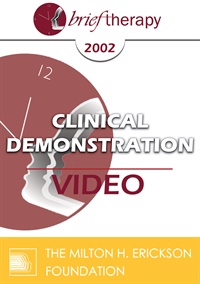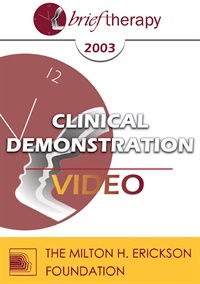- Average Rating:
- Not yet rated
- Topic Areas:
- Clinical Demonstrations | Psychotherapy | Brief Therapy | Meditation, Spirituality and Yoga
- Categories:
- Brief Therapy Conference | Brief Therapy Conference 2002
- Faculty:
- Stephen Gilligan, PhD
- Course Levels:
- Master Degree or Higher in Health-Related Field
- Duration:
- 55:03
- Format:
- Audio and Video
- Original Program Date:
- Dec 13, 2002
- Short Description:
- Educational Objectives: 1) To describe how therapists can connect clients to a calm, centering inner state. 2) To describe how connection to the inner self can allow new resources and solutions to develop.
- Price:
- $59.00 - Base Price
- Average Rating:
- Not yet rated
- Topic Areas:
- Clinical Demonstrations | Psychotherapy | Brief Therapy | Meditation, Spirituality and Yoga | Resources
- Categories:
- Brief Therapy Conference | Brief Therapy Conference 2003
- Faculty:
- Stephen Gilligan, PhD
- Course Levels:
- Master Degree or Higher in Health-Related Field
- Duration:
- 51:51
- Format:
- Audio and Video
- Original Program Date:
- Dec 12, 2003
- Short Description:
- Educational Objectives: 1) To describe how therapists can connect clients to a calm, centering inner state. 2) To describe how connection to the inner self can allow new resources and solutions to develop.
- Price:
- $59.00 - Base Price
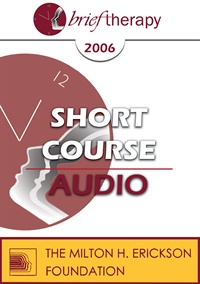
- Average Rating:
- Not yet rated
- Topic Areas:
- Short Courses | Brief Therapy | Meditation, Spirituality and Yoga | Multicultural | Psychotherapy
- Categories:
- Brief Therapy Conference | Brief Therapy Conference 2006
- Faculty:
- Lilian Borges, MA, LPC
- Duration:
- 1:18:38
- Format:
- Audio Only
- Original Program Date:
- Dec 07, 2006
- Short Description:
- In a world that is becoming more and more global and diverse, the need for a multicultural understanding of human experience is vital, especially for health care providers. Spirituality and religion are important elements of the culture. Spirituality and religion play a very important role in shaping how people are, the way they deal with birth and death, marriage and family, etc., and what is disease and how to cure it.
- Price:
- $15.00 - Base Price
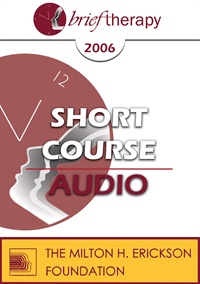
- Average Rating:
- Not yet rated
- Topic Areas:
- Short Courses | Art and Creativity | Brief Therapy | Meditation, Spirituality and Yoga | Music
- Categories:
- Brief Therapy Conference | Brief Therapy Conference 2006
- Faculty:
- Harvey Wasserman, MD
- Duration:
- 1:18:05
- Format:
- Audio Only
- Original Program Date:
- Dec 07, 2006
- Short Description:
- Balancing the emotions and a transformational visualization are two visualizations that permit patients to actively work on pressing life issues during and between therapy sessions. Each visualization will finish with a musical composition by Ray Lynch that enhances the effectiveness and purpose of the visualization.
- Price:
- $15.00 - Base Price
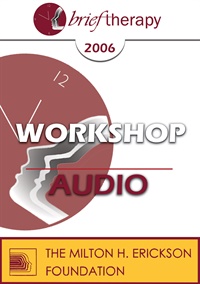
- Average Rating:
- Not yet rated
- Topic Areas:
- Workshops | Meditation, Spirituality and Yoga | Psychotherapy | Brief Therapy | Experiential Therapy
- Categories:
- Brief Therapy Conference | Brief Therapy Conference 2006
- Faculty:
- Frances Vaughan, PhD
- Duration:
- 2:16:24
- Format:
- Audio Only
- Original Program Date:
- Dec 09, 2006
- Short Description:
- Given the increasing popularity of spirituality in the culture, this workshop will address the relationship of spirituality to mental health. We will combine discussion with experiential exercises demonstrating practical methods of spiritual inquiry. Participants will learn to identify common problems associated with spirituality and strategies for encouraging healthy spiritual growth.
- Price:
- $15.00 - Base Price
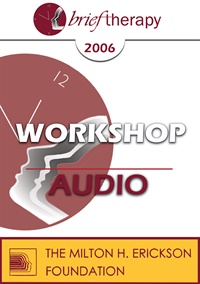
- Average Rating:
- Not yet rated
- Topic Areas:
- Workshops | Brief Therapy | Pain and Healing | Psychotherapy | Meditation, Spirituality and Yoga
- Categories:
- Brief Therapy Conference | Brief Therapy Conference 2006
- Faculty:
- Betty Alice Erickson, MS, LPC, LMFT
- Duration:
- 2:28:19
- Format:
- Audio Only
- Original Program Date:
- Dec 10, 2006
- Short Description:
- This workshop will discuss differences between healing and treatment, and the incorporation of healing into standard psychotherapy. Methods of interweaving healing and spirituality with treatment interventions will be discussed and demonstrated in an experiential format. Exercises will be given so participants can create and experience aspects of healing useful in therapy.
- Price:
- $15.00 - Base Price
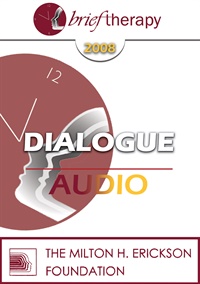
- Average Rating:
- Not yet rated
- Topic Areas:
- Dialogues | Brief Therapy | Meditation, Spirituality and Yoga | Psychotherapy | Therapist Development
- Categories:
- Brief Therapy Conference | Brief Therapy Conference 2008
- Faculty:
- Steven Hayes, PhD | James Prochaska, PhD
- Duration:
- 1:02:15
- Format:
- Audio Only
- Original Program Date:
- Dec 13, 2008
- Short Description:
- BT08 Dialogue 02 - Science, Practice and Spirituality Issues - Steven Hayes, PhD, James Prochaska, PhD
- Price:
- $15.00 - Base Price
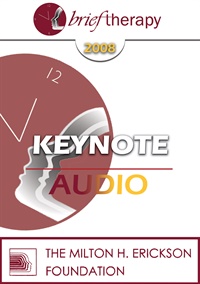
- Average Rating:
- Not yet rated
- Topic Areas:
- Keynotes | Brief Therapy | Affective Science | Belief Systems | Meditation, Spirituality and Yoga | Mindfulness | Positive Psychology
- Categories:
- Brief Therapy Conference | Brief Therapy Conference 2008
- Faculty:
- Joan Borysenko, PhD
- Duration:
- 59:33
- Format:
- Audio Only
- Original Program Date:
- Dec 12, 2008
- Short Description:
- Science and spirituality meet in this keynote. Drawing on her background as a cancer cell biologist and her work in behavioral medicine, Borysenko explores intuition, positive emotions, contemplative practice, and what she calls the “soul’s compass.” Blending neuroscience, story, and guided reflection, she invites therapists to consider guidance not as dogma, but as an embodied experience of presence, love, and aliveness that can orient both clinical work and personal life.
- Price:
- $15.00 - Base Price
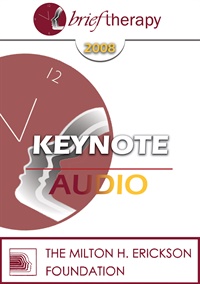
- Average Rating:
- Not yet rated
- Topic Areas:
- Keynotes | Brief Therapy | Community | Meditation, Spirituality and Yoga | Therapist Development
- Categories:
- Brief Therapy Conference | Brief Therapy Conference 2008
- Faculty:
- Jean Houston, PhD
- Duration:
- 1:03:17
- Format:
- Audio Only
- Original Program Date:
- Dec 13, 2008
- Short Description:
- Participants will learn how to incorporate sensory, psychological, mythic, spiritual and unitive states to bring personal potential to social change at a community, professional and cultural level.
- Price:
- $15.00 - Base Price
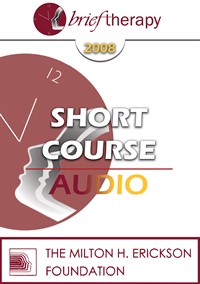
- Average Rating:
- Not yet rated
- Topic Areas:
- Short Courses | Metaphors | Brief Therapy | Humor | Meditation, Spirituality and Yoga
- Categories:
- Brief Therapy Conference | Brief Therapy Conference 2008
- Faculty:
- Betty Blue, PhD
- Duration:
- 1:10:52
- Format:
- Audio Only
- Original Program Date:
- Dec 11, 2008
- Short Description:
- Isolation often grows out of shame, over-identification with pain, and the loss of playful connection. In this experiential and story-rich short course, Betty Blue weaves metaphor, humor, Eastern philosophy, attachment theory, and psychoneuroimmunology to show how compassionate, light-hearted presence can soften suffering without minimizing it. Through vivid clinical stories and audience participation, she invites therapists to use themselves as living metaphors of warmth, play, and grounded hope.
- Price:
- $15.00 - Base Price
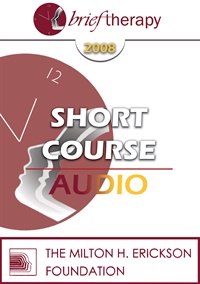
- Average Rating:
- Not yet rated
- Topic Areas:
- Short Courses | Brief Therapy | Meditation, Spirituality and Yoga | Research
- Categories:
- Brief Therapy Conference | Brief Therapy Conference 2008
- Faculty:
- Alexander Simpkins, PhD | Annellen M. Simpkins, PhD
- Duration:
- 1:25:19
- Format:
- Audio Only
- Original Program Date:
- Dec 11, 2008
- Short Description:
- Meditation offers useful and varied methods for brief therapy. Important scientific studies on meditation's neuroscience and clinical applications show many meditation methods are effective. Yoga, Buddhism, Daoism and Zen are described, each with its key concepts and unique approaches to mental development. Attendees learn research, theory and useful meditation methods step-by-step, including concentration, breathing, mindfulness, wu-wei, qi gong and zazen. Case examples form links to practice. Therapists will fine lasting solutions to enhance therapeutic work.
- Price:
- $15.00 - Base Price
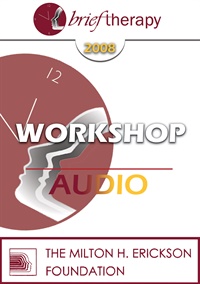
- Average Rating:
- Not yet rated
- Topic Areas:
- Workshops | Children and Adolescent Therapy | Brief Therapy | Meditation, Spirituality and Yoga | Mindfulness | Strengths-Based
- Categories:
- Brief Therapy Conference | Brief Therapy Conference 2008
- Faculty:
- Matthew Selekman, MSW
- Duration:
- 2:34:38
- Format:
- Audio Only
- Original Program Date:
- Dec 11, 2008
- Short Description:
- Adolescent self-harming behavior is on the rise and is one of the most challenging presenting problems school professionals, healthcare providers, and therapists will face in their clinical practice settings. In this "hands-on" practice-oriented workshop, participants will learn several distress management tools and strategies to strengthen the adolescent's self-soothing and coping capacities and family connection building rituals and therapeutic experiments to foster closer and stronger parent-adolescent relationships. Parent management skills for constructively responding to their adolescents' inevitable self-harming slips will be presented.
- Price:
- $15.00 - Base Price
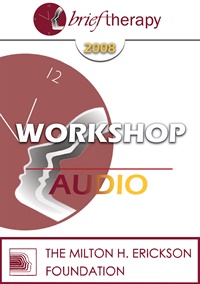
- Average Rating:
- Not yet rated
- Topic Areas:
- Workshops | Brief Therapy | Mindfulness | Psychotherapy | Meditation, Spirituality and Yoga
- Categories:
- Brief Therapy Conference | Brief Therapy Conference 2008
- Faculty:
- Joan Borysenko, PhD
- Duration:
- 2:03:07
- Format:
- Audio Only
- Original Program Date:
- Dec 12, 2008
- Short Description:
- Change can feel like exile, collapse, or an unexpected invitation. In this experiential workshop, Borysenko weaves Viktor Frankl, anthropology, archetypal psychology, and mindfulness into a practical framework for navigating “the place between no longer and not yet.” Through meditation, inquiry, and dialogue, participants explore resilience, trust, and the inner resources that allow loss to become transformation rather than despair.
- Price:
- $15.00 - Base Price
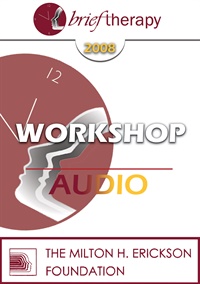
- Average Rating:
- Not yet rated
- Topic Areas:
- Workshops | Generative Psychotherapy | Brief Therapy | Buddhism | Meditation, Spirituality and Yoga | Mindfulness | Psychotherapy
- Categories:
- Brief Therapy Conference | Brief Therapy Conference 2008
- Faculty:
- Stephen Gilligan, PhD
- Duration:
- 2:43:38
- Format:
- Audio Only
- Original Program Date:
- Dec 14, 2008
- Short Description:
- The challenge of personal transformation is faced differently in the East and West. Typically, Eastern meditation emphasizes how to cultivate higher states of consciousness that "go beyond" ego identifications, while Western therapy focuses on how to "work through" problematic states. This workshop explores an integrative model that suggests how to use both approaches in a complementary way: sometimes "transcending, sometimes "transforming", and often doing both at the same time. The connection between meditation, generative trance, and selfrelations will be a central focus.
- Price:
- $15.00 - Base Price
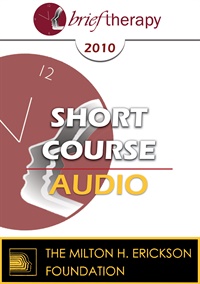
- Average Rating:
- Not yet rated
- Topic Areas:
- Short Courses | Meditation, Spirituality and Yoga | Mind-Body | Mindfulness | Multicultural | Belief Systems | Psychotherapy | Brief Therapy
- Categories:
- Brief Therapy Conference | Brief Therapy Conference 2010
- Faculty:
- Jeanne Hernandez
- Duration:
- 1:38:23
- Format:
- Audio Only
- Original Program Date:
- Dec 09, 2010
- Short Description:
- This workshop explores how the Indian belief system contains ingredients to keep the mind and body in harmony and promote wellbeing. We will explore adding into psychotherapy sessions totem strengths, shaman journeys, medicine wheels, time-frames, respect and gratitude; the circle of life, and symbols as reminders of the “right” path. With Jeanne Hernandez.
- Price:
- $15.00 - Base Price
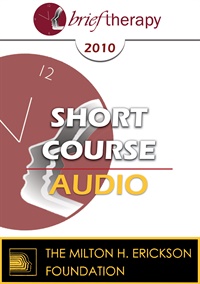
- Average Rating:
- Not yet rated
- Topic Areas:
- Meditation, Spirituality and Yoga | Short Courses | Storytelling | Brief Therapy
- Categories:
- Brief Therapy Conference | Brief Therapy Conference 2010
- Faculty:
- Elisa Gottheil, PhD
- Duration:
- 41:57
- Format:
- Audio Only
- Original Program Date:
- Dec 09, 2010
- Short Description:
- Brief therapy using narratives to spiritual images utilizes the innate human ability to create stories and to discover the solutions to problems that lie within the self. This approach utilizes principles of psychodynamic theory such as projection, as well as narrative therapy and hypnotherapy principles. With Elisa Gottheil.
- Price:
- $15.00 - Base Price
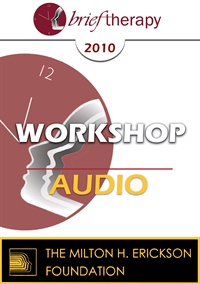
- Average Rating:
- Not yet rated
- Topic Areas:
- Meditation, Spirituality and Yoga | Psychotherapy | Workshops
- Categories:
- Brief Therapy Conference | Brief Therapy Conference 2010
- Faculty:
- Kathryn Rossi, PhD
- Duration:
- 2:44:03
- Format:
- Audio Only
- Original Program Date:
- Dec 10, 2010
- Short Description:
- BT10 Workshop 19 - Therapeutic Yoga: A New Brief Creative Psychotherapy - Kathryn Rossi, PhD This workshop is an introductory presentation of a new narrative approach to therapeutic yoga that can be used by everyone in everyday life. We build a neuroscience bridge between the Cartesian mind-body gap with positive therapeutic narratives that accompany classical yoga movements and the four stage creative process for resolving our ongoing life issues.
- Price:
- $15.00 - Base Price
Tags: Mind-Body
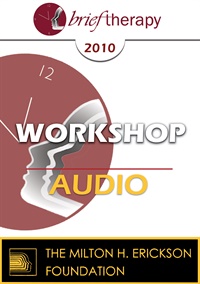
- Average Rating:
- Not yet rated
- Topic Areas:
- Meditation, Spirituality and Yoga | Workshops | Marriage | Mindfulness | Brief Therapy | Buddhism | Couples Therapy
- Categories:
- Brief Therapy Conference | Brief Therapy Conference 2010
- Faculty:
- Jon Carlson
- Duration:
- 2:51:00
- Format:
- Audio Only
- Original Program Date:
- Dec 12, 2010
- Short Description:
- Mindfulness is a deceptively simple way of relating to experience that has been successfully practiced for over 2500 years to alleviate human suffering and to increase awareness. Recently clinicians are discovering that mindfulness holds great promise as an add-on to couples therapy and education leading to greater kindness, love and acceptance. This program will discuss, demonstrate and offer experiential activities on how mindfulness can facilitate brief changes when working with couples.
- Price:
- $15.00 - Base Price
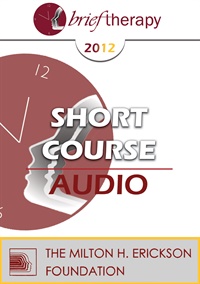
- Average Rating:
- Not yet rated
- Topic Areas:
- Hypnosis | Meditation, Spirituality and Yoga | Short Courses | Mindfulness | Buddhism | Hypnotherapy
- Categories:
- Brief Therapy Conference | Brief Therapy Conference 2012
- Faculty:
- Thomas Roberts
- Duration:
- 1:27:06
- Format:
- Audio Only
- Original Program Date:
- Dec 05, 2012
- Short Description:
- This Short Course will explore the reciprocal contributions between hypnotherapy and Buddhist/mindfulness meditation. Participants will learn how to incorporate the language of mindfulness (spaciousness, acceptance/ patience, openness, compassion) into the therapeutic/hypnotherapeutic practices, thus helping clients embrace the benefits that both have to offer.
- Price:
- $15.00 - Base Price
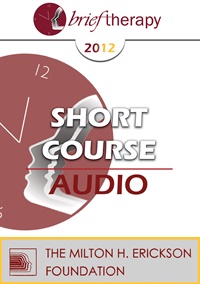
- Average Rating:
- Not yet rated
- Topic Areas:
- Psychotherapy | Meditation, Spirituality and Yoga | Short Courses | Multicultural
- Categories:
- Brief Therapy Conference | Brief Therapy Conference 2012
- Faculty:
- Assen Alladin, PhD
- Duration:
- 1:35:13
- Format:
- Audio Only
- Original Program Date:
- Dec 05, 2012
- Short Description:
- This short course shows how mindfulness can be woven into psychotherapy in practical, culturally responsive ways. Using case material, metaphor and a live hypnosis demonstration, the presenter illustrates how awareness, acceptance, gratitude and heart–mind integration help clients loosen rigid beliefs, reduce rumination and reengage with the present. Participants learn informal mindfulness strategies that complement CBT and hypnotherapy, offering clients experiential tools for emotional flexibility and renewed agency.
- Price:
- $15.00 - Base Price
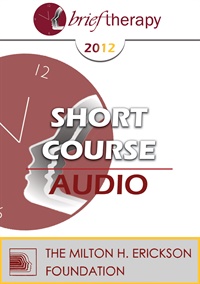
BT12 Short Course 20 – Transforming Patient’s Vulnerability into Identity Strength – Consuelo Casula
- Average Rating:
- Not yet rated
- Topic Areas:
- Meditation, Spirituality and Yoga | Short Courses
- Categories:
- Brief Therapy Conference | Brief Therapy Conference 2012
- Faculty:
- Consuelo Casula, Dipl. Psych
- Duration:
- 1:36:53
- Format:
- Audio Only
- Original Program Date:
- Dec 05, 2012
- Short Description:
- BT12 Short Course 20 – Transforming Patient’s Vulnerability into Identity Strength – Consuelo Casula Patients bring to therapy unhappiness caused by personal, social, professional, and moral problems, and therapists need to face them with an approach based on utilizing the hidden strengths in each component of the person. This workshop will present the Identity Strength Focused approach, with its method, techniques and metaphors to empower patients in healing their wounds, following spiritual values, finding the strength coming from mind-body coherence, empathy with others, and engagement in their job.
- Price:
- $15.00 - Base Price
Tags: Mind-Body Pain & Healing
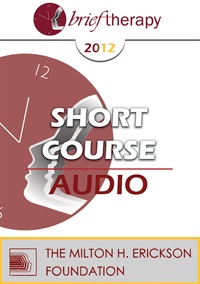
- Average Rating:
- Not yet rated
- Topic Areas:
- Short Courses | Ericksonian Hypnosis and Therapy Techniques | Meditation, Spirituality and Yoga
- Categories:
- Brief Therapy Conference | Brief Therapy Conference 2012
- Faculty:
- Cheryl Bell-Gadsby, M.A., R.C.C. | Kathleen Donaghy
- Duration:
- 1:54:04
- Format:
- Audio Only
- Original Program Date:
- Dec 09, 2012
- Short Description:
- When clients feel stuck, sometimes insight alone is not enough. This workshop demonstrates how energy work and Ericksonian hypnosis can be combined to interrupt entrenched patterns, deepen attunement, and activate the body’s natural drive toward balance. Through live exercises, case examples, and discussion of psychoneuroimmunology, participants experience how working with chakras, imagery, and relational connection can shift resistance, restore flow, and open new possibilities for change.
- Price:
- $15.00 - Base Price
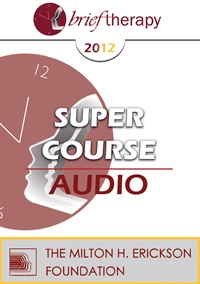
- Average Rating:
- Not yet rated
- Topic Areas:
- Meditation, Spirituality and Yoga | Super Courses
- Categories:
- Brief Therapy Conference | Brief Therapy Conference 2012
- Faculty:
- Kathryn Rossi, PhD
- Duration:
- 2:25:06
- Format:
- Audio Only
- Original Program Date:
- Dec 09, 2012
- Short Description:
- BT12 Super Course 05 – Mythic Yoga: Creative Transformations Through Body and Mind – Kathryn Rossi, PhD Is personal enlightenment really possible? Can we creatively experience our own transformational stories via yoga? We propose Erickson’s naturalistic–utilization therapy and Rossi’s 4-stage creative process are consistent with yoga’s ancient science of self-inquiry, mental dexterity and Buddha’s Four Noble truths. In this workshop we will have an opportunity to experience the stories of ancient yoga and self-transformation as presented in our new book, Creating Consciousness: How Therapists can Facilitate Wonder, Wisdom, Beauty, & Truth. We will practice gentle hatha yoga for all fitness levels and volunteers will share their current life transitions. Please bring your yoga mat if you have one.
- Price:
- $15.00 - Base Price
Tags: Mind-Body
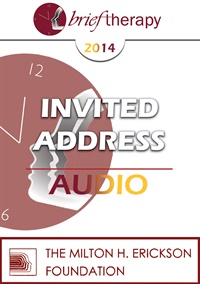
- Average Rating:
- Not yet rated
- Topic Areas:
- Post-Traumatic Stress Disorder (PTSD) | Meditation, Spirituality and Yoga | Invited Addresses | Trauma | Mind-Body
- Categories:
- Brief Therapy Conference | Brief Therapy Conference 2014
- Faculty:
- Bessel van der Kolk, MD
- Duration:
- 1:00:58
- Format:
- Audio Only
- Original Program Date:
- Dec 14, 2014
- Short Description:
- Chronic trauma interferes with self-perception and self-regulation. We will discuss effective approaches.
- Price:
- $15.00 - Base Price
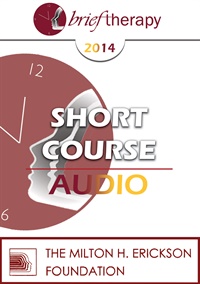
- Average Rating:
- Not yet rated
- Topic Areas:
- Short Courses | Experiential Therapy | Brief Therapy | Meditation, Spirituality and Yoga | Mindfulness
- Categories:
- Brief Therapy Conference | Brief Therapy Conference 2014
- Faculty:
- Susan Pinco, PhD
- Duration:
- 1:34:55
- Format:
- Audio Only
- Original Program Date:
- Dec 11, 2014
- Short Description:
- This experiential seminar will lead attendees in an exploration of mindful silence and its role in the clinical encounter. Our journey will begin with a taste of both structured and unstructured silence followed by a discussion of how both are manifested, experienced, and potentially utilized in the clinical encounter. Research related to silence in psychotherapy and recent findings in neuroscience will help explain why silence is a key ingredient in effective transformational processes.
- Price:
- $15.00 - Base Price


